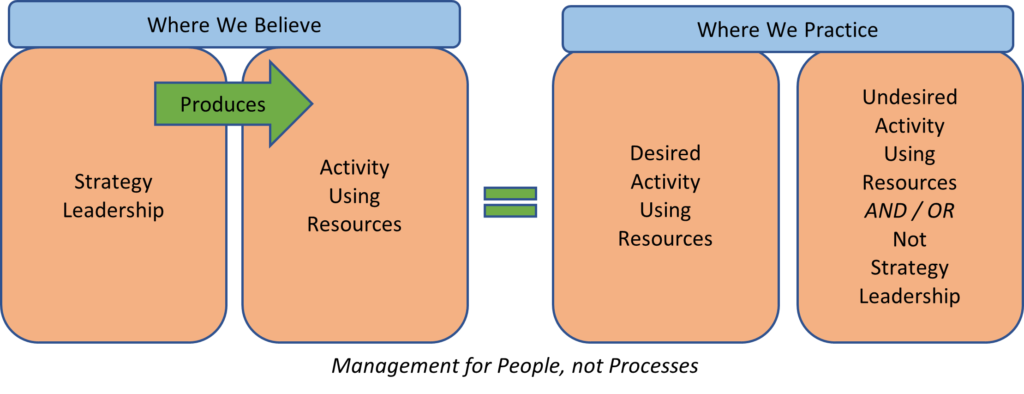Tools for Organization for Discipleship Ministries

Connect with me
‘From the Abundance of the Heart, Speaks the Mouth’
Regarding the graphic, ‘Out of Strategy and Leadership, Resources facilitate Activity’. In mathematics it is possible to see all results of the ‘If -Then’ formula. I break it down into 3 resulting areas and I use this formula to perform root cause analysis and to orderly develop strategy process.
This page addresses the ‘Mouth’ part of the formula. The Mouth is a tool, or medium, in which words are spoken. Beliefs cause actions and those actions need tools to be realized. This is the last look I consider because it is, in a sense, the least important, though absolutely critical. I cannot communicate without some sort of tool. However, that tool could be my vocal cords, a stick and some dirt, or a myriad of other ways to get a message across.
Tools are constantly being introduced and evolved. Especially in business. The best way to use technology, as stated by Jim Collins in his book, Good to Great, is as “an accelerator of momentum rather than a creator of it.” I believe all tools can be summarized in the same way. Tools accelerate momentum, they do not create it.
To reinforce my formula, ‘From the Abundance of the Heart, Speaks the Mouth’, when there are ‘Speaking’ issues, definitely look at the tools to be sure they are working properly and updated as much as possible. However, they are not the cause of most problems nor are they always the door to desired opportunity. The ‘Speaking’ issues are nearly all related to the Abundance of the Heart (Strategy and Leading). Getting new software usually does not solve people issues. It can solve acceleration and tool issues though. Professional speakers use tongue twister exercises to keep their mouth flexible and speaking is clearer. Improving tools does help!
… the Mouth …

My Personal Toolkit
As General Manager, Sales Manager, Customer Service in the service industry and volunteer work in the church, I have used many tools. The bigger an organization gets, the more important it is to have tools and that people use them for effective communication.
I primarily use a PC with Microsoft, but often use an Apple Macbook Pro. For project planning I love using Gantt charts. SMART goals keep my activities meaningful, relevant, and growth oriented. Specific software I am good at or have used is Microsoft Office (Especially Excel), Google Docs, ‘R’ Programming, SQL, Salesforce, Zoho, Facebook Business, Google Analytics, MailChimp, Hootsuite, and Music Software related to Podcasting.
These tools have calendars for personal and share use. Use them for meetings, tasks, collaboration. Use tools for data collection and reporting the data. Dashboards are necessary and customizable for different stakeholders. Map out the strategy and keep track of goals and how things are going. Get metrics on a good tool and use it!
Budgets are important financial management tools but can also be reflections and metrics of what is going on with people. Financial reviews provide much more than simple profit and loss.
In the ministry, discipleship is not robotic, and goals may take much longer than expected and go in many directions never envisioned. That is ok, don’t get hung up on the goal, get hung up on whether people are being shepherded. The goal is only there to provide some sort of direction for participation. The true meaning of discipleship is really about the journey and growth. God will accomplish what He desires, and He always reaches His goals. He does like us to participate!

Training
The pastor brings a message from the word of God. He does many more things as well as teach. But he is not the only member of the body. What is your medium for teaching and training? Sunday school? Wednesday night Bible study? Who and how are the teachers of these studies being taught? These are but brief examples of the kind of process that needs to be considered and thought out and applied. Be sure of this, people desire to be trained regularly! They want confidence in knowing what they are doing is right and appreciated! Training is a type of recognition of people and their gifts.
Gospel Articulation: I reinforce my strong opinion that every church needs to have a class ready for new believers and old believers and those classes need to be regular. There are many examples of people in leadership who have long tenure and do not believe Jesus really rose from the dead. I have been a part of groups of believers who know they’re saved, and I am sure they are. But when asked to articulate the gospel, they know very little and can’t. Not everyone is called to go away on mission, but everyone is called to be ready to give an answer for the hope they have. There should always be a ‘What is the gospel?’ class with next steps for the new believer and local church vision, mission, and value teaching for the old believers.
Gospel Objections: This is not for the new believers, but old believers often do not know how to discuss the Bible with non-believers. This is too frequently because of laziness and an underlying attitude of not caring about the lost and other people. Not everyone has to be and expert in everything, but a little knowledge goes a long way, even if it’s to know where to point people for answers. How might we discuss the gospel with Muslims who believe in one god? How might we do that with Hindus who believe in lots of gods? What about the regular Buddhist teaching that one treats themselves as god? Just a few examples of regular culture talk that is wise to acknowledge and teach.
Don’t forget that leaders need regular training too, elders, pastors, deacons.
Does everyone have the same learning style? No. This is important to consider when learning and teaching. Many styles rely on simple lecture, but there are at least 7 unique styles, maybe more, that have been identified in how a person learns. Auditory and musical, visual and spatial, verbal, logical and mathematical, physical or kinesthetic, social and interpersonal, and solitary and intrapersonal. Using different styles reaches different people.
Recognition
People need to know they matter. When do your recognize volunteers? When do you recognize the leadership? Yes, we serve the Lord, and He will reward. But we are to be like Him.
It is also important to remember that not everyone will ask questions and feel free to speak up when there are questions or concerns. This needs to be a proactive conversation from a leader. Every participant in every area needs follow up.
Roadmaps for Activity
Roadmaps, even on mobile devices, tell a person how to get from point A to point B. Goals that are not written down are just wishes, Fitzhugh Dodson. Goal setting was researched by a Harvard Business Study. Of total respondents, 83% had no goals. 14% had plans but had not written them down and were ten times more likely to succeed than those without any goals. 3% wrote down their goals and were three times more likely to succeed than the group who had some plan in mind. This is observable science and God given revelation. Get a roadmap!
Discipleship Tools and Resources
How will people in every group and hierarchy level receive information and resources. Will there be a newsletter? Email, phone call, group text? What is distributed, how is it distributed, and who ensures that it has been? This is not only for training classes or discipleship training, but also for people resources as well. Who needs help and what kind of help? What serve needs and upcoming events are on the way for people involvement? What are the appropriate channels?
Who is maintaining the non-people resources; books, videos, lesson material, etc.?
Every church believes that every church is under the mandate to equip the believers and evangelize to the lost. It is difficult for churches to balance this however, and there are many opinions and desires involved when leading the church as to how this is accomplished. For the purposes of discipleship, these are two primary categorical areas that can be addressed with roadmaps, analyzing, and strategy to help the church accomplish the mission God gives them.
Spiritual Growth (Equipping)
The Bible teaches we are to grow into maturity. This is process and as stated before, leaders use the ideal to help others grow from their current state towards the ideal, within the framework of the Vision, Mission, and Values. Leadership requires on purpose actions with purpose.
Spiritual gift assessments are often given and often helpful. Not everyone agrees on the same points, and some believe they can be more harmful than helpful. This is something to decide for yourself, but it should be made clear one way or the other and why. It is a tool, an end to a means. Simply acknowledging it or ignoring is not good enough. Members know enough to explore this and make their own meaning if none is taught.

To see an example of a Spiritual Growth road map CLICK HERE. This pamphlet was put together by Rev. Chris Kindle, Director of Discipleship and Spiritual Formation. You may or may not agree with every point, but it is a good pamphlet that outlines on purpose leadership and tracking. There is a lot that might be added.
What are the stages of growth you want to see? How will you track and monitor it? Who is being trained? What resources are provided? How will the upper hierarchy be involved to shepherd those learning and growing and how often? Good growth style groups include covenant groups, one-on-one accountability and leadership training. Life groups (led and managed properly), ministry teams, and classes are tools for maturity and unifying in the knowledge of Christ Jesus.
How will each group from the smallest to those in the elder hierarchy be accountable and grown? How will each group be supported?
Outreach (Evangelism)
How are local groups outside the church handled? Who are they, who is making contact, who is liaising with them in outreach? There are local, city, and global opportunities to not only help people in the church, but for the church to witness in these groups. Who is training the outreach team? What are the proper channels and do people know who to refer those who need help to?
What tools are in place to reach those looking for support groups, service groups, and witness groups? Who is leading this, who is teaching it?
Wrap Up
Strategy is all about the interconnectivity of beliefs to action customized for various forms of organisms.
Step 1: ‘The Abundance’ = Vision, Mission, Values
Step 2: ‘The Heart, Speaks‘ = Actual VS Ideal
Step 3: ‘The Mouth’ = The Tools
This is Jeremy’s passion; these are Jeremy’s strengths. People are Jeremy’s motivation.